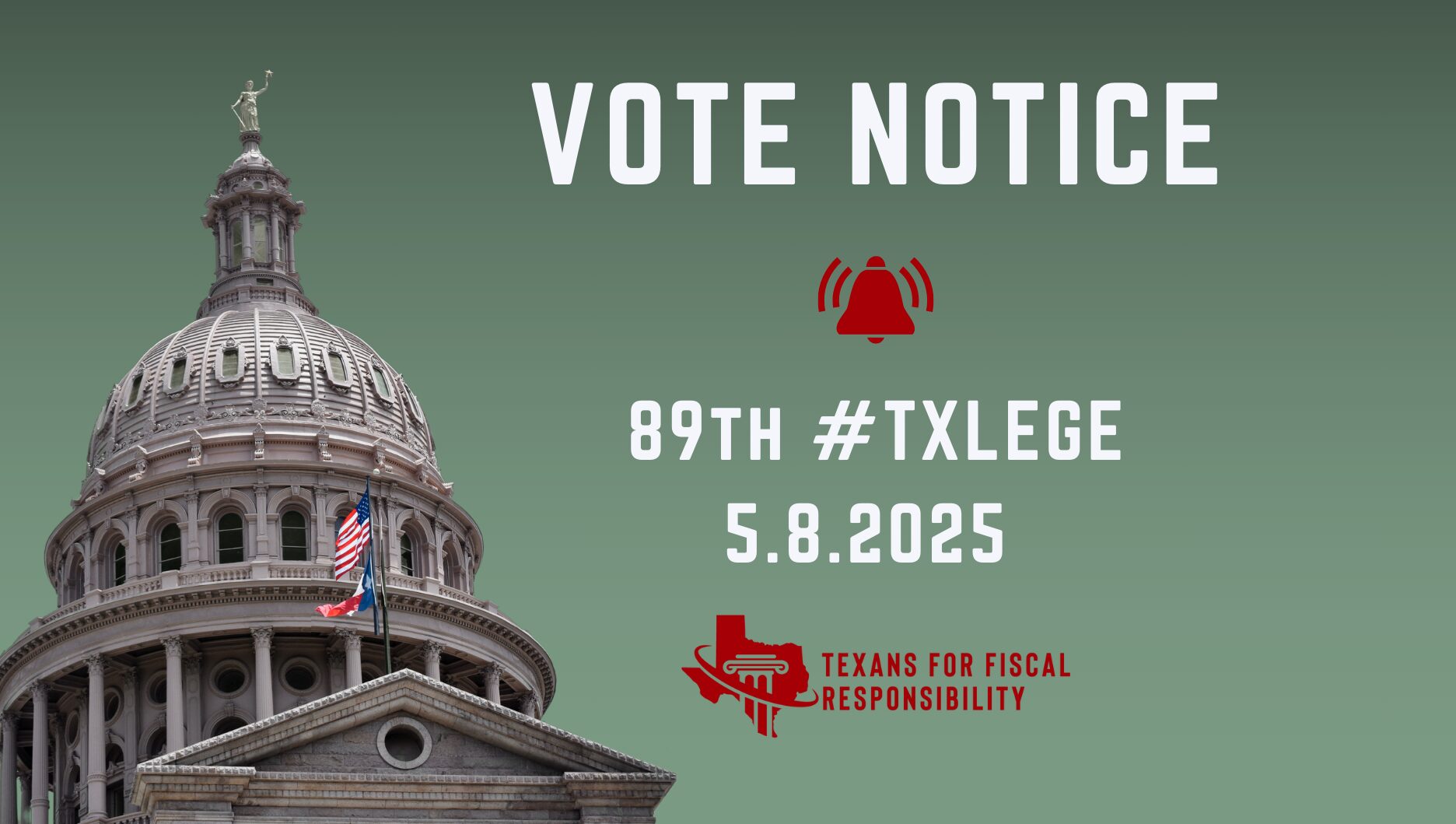
Texans for Fiscal Responsibility has issued the following vote notice for May 8th, 2025
Texas House of Representatives
Subject: Senate Bill 17 (SB 17) – Hostile Foreign Property Ownership
- Author: State Sen. Lois Kolkhorst (R-Brenham)
- Caption: Relating to the purchase or acquisition of an interest in real property by certain aliens or foreign entities.
- TFR Position: SUPPORT / AMEND
- Background:
- SB 17 is a prudent measure that seeks to protect Texas’ economic and national security interests by preventing hostile foreign entities from acquiring key real property and natural resources. This safeguards long-term economic stability, prevents foreign exploitation or reliance, and protects against hostile entities with deep pockets and financial backing from buying up land or homes, taking away opportunities for citizens or future citizens. Ultimately, SB 17 reinforces economic sovereignty, national security. However, CSSB 17 should be amended to strengthen the bills provisions and close loopholes, including with stricter financial and/or criminal penalties, so that foreign entities do not view the risk of getting caught violating the provisions of the bill as simply the “cost of doing business.”
Subject: Senate Bill 17 (SB 17) – Hostile Foreign Property Ownership (Specific Amendments)
- Author: State Sen. Lois Kolkhorst (R-Brenham)
- Caption: Relating to the purchase or acquisition of an interest in real property by certain aliens or foreign entities.
- TFR Position: OPPOSE Specific Amendments / SUPPORT Specific Amendments
- Background:
- Amendments that seek to strengthen the bills provisions, including but not limited to the Pre-filed Tinderholt amendment, should be supported. Amendments that seek to weaken the bills provisions, should be opposed.
Subject: House Bill 5138 (HB 5138) – Election Enforcement by AG
- Author: State Rep. Matt Shaheen (R-Plano)
- Caption: Relating to the duty of the attorney general to prosecute criminal offenses prescribed by the election laws of this state.
- TFR Position: SUPPORT
- Background:
- HB 5138 ensures that election law violations are prosecuted even when local prosecutors fail to act, restoring accountability and deterring voter fraud. The bill grants the Attorney General mandatory authority to step in after six months of local inaction, streamlining enforcement and closing loopholes exposed by recent court rulings. The bill defends the integrity of one of our most fundamental civic processes—voting. For these reasons, TFR supports HB 5138.
Subject: House Joint Resolution 161 (HJR 161) – Citizenship requirement for voting
- Author: State Rep. Candy Noble (R-Lucas)
- Caption: Proposing a constitutional amendment adding individuals who are not United States citizens to the classes of persons not allowed to vote in this state.
- TFR Position: SUPPORT
- Background:
- HB proposes a constitutional amendment to ensure that only United States citizens can vote in any election held in Texas. While current law requires voter citizenship, this amendment would prevent future local policies from expanding voting rights to non-citizens. It also safeguards taxpayer-funded governance by ensuring that only those fully vested in the nation’s interests—its citizens—can shape public policy. Enshrining this principle in the Constitution provides long-term security and reduces the risk of politically motivated changes in election law.
Subject: House Bill 1937 (HB 1937) – Streamlines audit dispute process
- Author: State Rep. Tom Craddick (R-Midland)
- Caption: Relating to certain tax and fee collection procedures and taxpayer suits.
- TFR Position: SUPPORT
- Background:
- HB 1937 gives Texas taxpayers a faster, more flexible way to challenge audit results by allowing them to skip the usual redetermination process and head straight to court. If a taxpayer disagrees with the outcome of a managed audit on sales or gas taxes, they can file a notice within 60 days and potentially avoid a lengthy administrative hearing. This bill ensures that disputes can be resolved in district court without requiring full payment up front, reducing financial burdens and leveling the playing field. During the court case, the state cannot collect the disputed amount, though it can still file liens or request a financial guarantee. It also ensures penalties are waived during litigation if the taxpayer follows proper procedure. This bill reduces bureaucratic red tape, increases judicial access, and protects taxpayers from aggressive collections. It reflects a limited-government approach by emphasizing due process and transparency in tax enforcement.
Subject: House Bill 5444 (HB 5444) – Protects voter-approved tax limits
- Author: State Rep. Ellen Troxclair (R-Spicewood)
- Caption: Relating to the authority of the governing body of a school district to adopt an ad valorem tax rate that exceeds the district’s voter-approval tax rate.
- TFR Position: SUPPORT
- Background:
- HB protects taxpayers by closing a loophole that some school districts have used to override the will of voters. When voters reject a property tax hike in a Tax Ratification Election, this bill ensures that the district cannot exploit a disaster exemption to impose the same or higher rate anyway. This reform is about respecting the outcome of elections and reinforcing fiscal accountability. The bill strengthens taxpayer rights and reins in abuse of emergency provisions for non-emergency purposes. By limiting government authority to raise taxes without clear voter consent, the bill helps to promote trust and fiscal restraint.
Subject: House Bill 321 (HB 321) – Medicaid express lane
- Author: State Rep. John Bucy (D-Austin)
- Caption: Relating to implementing an express lane option under Medicaid and the child health plan program.
- TFR Position: OPPOSE
- Background:
- HB 321 sets up an “express lane” to enroll children in Medicaid or CHIP using information from SNAP applications, aiming to increase coverage among uninsured but eligible children. While it requires parental consent before enrollment, it shifts administrative processes away from traditional eligibility checks and could result in a large influx of enrollees. The bill sidesteps more rigorous, independent income verification, instead relying on potentially outdated or misused data from SNAP applications. This represents a concerning expansion of dependency on public healthcare without proportional accountability. While the fiscal note says that costs cannot be determined for sure, it gives a potential example of over $300 million in new costs in just 2027, with additional spending likely in future years. The bill ultimately encourages more automatic enrollment into entitlement programs without corresponding cost control measures or exit strategies. From a limited government perspective, HB 321 increases bureaucratic reach and financial exposure without reforming eligibility or enhancing system integrity.
Subject: House Bill 5447 (HB 5447) – Local tax rate transparency
- Author: State Rep. Ellen Troxclair (R-Spicewood)
- Caption: Relating to the calculation of certain ad valorem tax rates.
- TFR Position: SUPPORT
- Background:
- HB 5447 increases transparency and accountability in local property tax rate calculations by requiring that each figure reported on tax forms be backed up with a linked document proving its accuracy. This change makes it easier for taxpayers to verify how local governments arrive at their tax rates, deterring manipulation or errors. It also mandates that these forms be digital and streamlined for compatibility with appraisal district databases, reducing inefficiency and paperwork. Additionally, the bill ensures that property values and tax impacts from special reinvestment zones are calculated separately, preventing vague or misleading aggregation. This bill supports taxpayer oversight, reduces government opacity, and strengthens local accountability.
Subject: House Bill 464 (HB 464) – New State grant program
- Author: State Rep. Mary González (D-San Elizario)
- Caption: Relating to the establishment of a grant program to support the elimination of illegally disposed of scrap tires.
- TFR Position: OPPOSE
- Background:
- HB 464 sets up a state-run grant program aimed at helping counties clean up and prevent the illegal dumping of used tires. It creates a dedicated fund within the state’s General Revenue account to pay for these efforts, including law enforcement, public outreach, and cleanup operations. While well intentioned, it opens the door to new spending without defining clear performance metrics or long-term funding limits. Additionally, there is no guarantee that the fund will be used efficiently or that measurable reductions in illegal dumping will occur. The bill also invites future appropriations and staffing increases at TCEQ, further expanding the size and cost of state government. Finally, this issue is most appropriately handled at the local level, not by a state-grant program with state tax dollars.
Subject: House Bill 3225 (HB 3225) – Ban explicit material in Libraries
- Author: State Rep. Daniel Alders (R-Tyler)
- Caption: Relating to the prohibition of access by minors to sexually explicit materials in municipal public library collections; providing a civil penalty.
- TFR Position: SUPPORT
- Background:
- HB 3225 aims to prevent sexually explicit content from being accessible to children in city-run public libraries by setting clear restrictions and consequences. It mandates that libraries review their collections yearly and establish a petition process for concerned citizens to flag inappropriate materials. Libraries that fail to comply may lose access to state grants and face fines. The measure protects taxpayers from subsidizing institutions that expose minors to explicit material, reinforcing accountability in how local entities manage public resources. By tying compliance to funding and enabling enforcement through civil penalties, the bill strengthens parental rights and protections for children. The bill balances limited government with proper stewardship of public institutions and taxpayer dollars.
Subject: House Bill 1290 (HB 1290) – Banning toxic additives in school meals
- Author: State Rep. Caroline Harris (R-Round Rock)
- Caption: Relating to prohibiting certain food additives from being included in free or reduced-price meals provided by school districts.
- TFR Position: SUPPORT / AMEND
- Background:
- HB 1290 seeks to ban harmful food additives from free or reduced-price school meals in Texas, aligning with bans already in place in the European Union and under consideration at the federal level. By eliminating chemicals linked to cancer, reproductive harm, and DNA damage, this legislation prioritizes children’s health and prevents associated long-term healthcare costs. Additionally, it promotes market-driven solutions by encouraging food providers to adopt safer, cost-effective alternatives without imposing new bureaucratic regulations or state spending. However, there are concerns regarding the “substantially similar” clause, and TFR encourages lawmakers to clarify the definition of “substantially similar.”
Subject: House Bill 2588 (HB 2588) – Expands cottage food freedoms
- Author: State Rep. Lacey Hull (R-Houston)
- Caption:Relating to cottage food production operations.
- TFR Position: SUPPORT
- Background:
- HB 2588 empowers home-based food entrepreneurs by expanding what foods they can legally produce and sell without excessive government interference. It lifts outdated restrictions on food types and raises the income cap to reflect inflation, allowing small businesses to grow naturally. By prohibiting cities and local health departments from requiring permits or licenses, the bill protects Texans from bureaucratic overreach and unnecessary fees. It also supports economic liberty by enabling cottage food producers to partner with vendors and enter retail markets, creating more opportunities for grassroots entrepreneurship. The bill also opens the door for donations and samples, enhancing community engagement and food accessibility. Overall, this legislation promotes self-reliance, reduces red tape, and upholds free market principles.
Subject: House Bill 4097 (HB 4097) – Audit accountability
- Author: State Rep. Cody Harris (R-Palestine)
- Caption: Relating to the penalty for noncompliance with certain audit requirements by a municipality.
- TFR Position: SUPPORT
- Background:
- HB 4097 strengthens financial transparency and accountability in local government by penalizing cities that ignore basic audit and reporting obligations. If a municipality fails to complete and file its annual audit and financial statements on time, any citizen can report the violation to the Attorney General. If the violation is confirmed, the city is prohibited from raising property taxes above the no-new-revenue tax rate until it complies. This ensures taxpayers aren’t punished by higher taxes when their local officials neglect financial transparency. It incentivizes sound fiscal governance, and empowers citizens to hold local governments accountable without creating new layers of regulation.
Subject: House Bill 4838 (HB 4838) – Language access assessments
- Author: State Rep. Penny Morales-Shaw (D-)
- Caption: Relating to conducting an assessment of language accessibility with respect to certain health and human services programs and 2-1-1 services provided by the Texas Information and Referral Network.
- TFR Position: OPPOSE
- Background:
- HB 4838 grows the state bureaucracy by requiring a new administrative program focused on language access across state services. It creates an additional layer of government oversight and injects mission creep into HHSC’s core responsibilities. The temporary nature of the program doesn’t mitigate the risk of it being extended or becoming permanent, adding long-term fiscal pressure. Private and local entities are better positioned to respond flexibly to language needs than centralized mandates. The bill also fails to specify cost controls or outcome-based benchmarks, risking inefficiency. Rather than increasing government roles, resources should prioritize core services, not additional coordinators and reports.
Subject: House Bill 4763 (HB 4763) – Faster fraud disclosure
- Author: State Rep. Mike Olcott (R-Aledo)
- Caption: Relating to reports by certain public institutions of higher education on fraud, waste, and abuse involving state resources.
- TFR Position: SUPPORT
- Background:
- HB 4763 enhances accountability in public higher education by ensuring suspected fraud or waste reports are promptly sent to the State Auditor. If a university has an internal system for reporting misuse of state funds or resources, this bill makes it mandatory to share those reports with the state within two business days. It promotes better stewardship of taxpayer dollars by reducing the risk of universities quietly burying internal allegations. The bill does not create new crimes or penalties. By shining a light on potential misuse of public funds, H.B. 4763 reinforces responsible governance. This bill is a step toward government transparency and reduced waste.
Texas Senate
Subject: House Joint Resolution 99 (HJR 99) – Animal feed tax exemption
- Author: State Rep. Cody Harris (R-Palestine)
- Caption: Proposing a constitutional amendment authorizing the legislature to exempt from ad valorem taxation tangible personal property consisting of animal feed held by the owner of the property for sale at retail.
- TFR Position: SUPPORT
- Background:
- HJR 99 proposes a constitutional amendment to allow the Texas Legislature to exempt animal feed held for retail sale from property taxes. Right now, while feed is tax-free during production and use, it’s unfairly taxed when held as inventory in stores. Removing this tax would reduce costs for feed suppliers and help lower prices for farmers and ranchers, who are already dealing with rising operational expenses. From a fiscally conservative standpoint, this is a smart move—it simplifies the tax code, prevents double-taxation, and supports small agricultural businesses without expanding government spending.
- It must be noted, however, that supporting legislation that uses exemptions as the form of providing tax relief, comes with some reticence. Exemptions inevitably narrow the tax base, shift burdens and make broad-based property tax relief or property tax elimination more difficult.
Subject: House Bill 29 (HB 29) – Municipal water system waste
- Author: State Rep. Stan Gerdes (R-Smithville)
- Caption: Relating to water losses reported by certain municipally owned utilities to the Texas Water Development Board; authorizing administrative penalties.
- TFR Position: SUPPORT
- Background:
- HB 29 introduces accountability measures for large city-run water utilities that are losing significant volumes of water due to infrastructure inefficiencies. It ensures these utilities validate their water loss data and develop a practical, goal-oriented plan to address and reduce waste. With Texans increasingly concerned about water scarcity and taxpayer-funded infrastructure, this bill provides transparency and encourages fiscal responsibility. It prevents utilities from perpetually neglecting maintenance while still charging ratepayers for unrecoverable water. By requiring concrete timelines and performance metrics, the bill ensures public resources are managed more efficiently.
Subject: House Bill 1399 (HB 1399) – Animal feed tax exemption
- Author: State Rep. Cody Harris (R-Palestine)
- Caption: Relating to an exemption from ad valorem taxation of tangible personal property consisting of animal feed held by the owner of the property for sale at retail.
- TFR Position: SUPPORT
- Background:
- HB 1399 is the enabling legislation for HJR 99. It exempts animal feed held for retail sale from property taxes. Right now, while feed is tax-free during production and use, it’s unfairly taxed when held as inventory in stores. Removing this tax would reduce costs for feed suppliers and help lower prices for farmers and ranchers, who are already dealing with rising operational expenses. From a fiscally conservative standpoint, this is a smart move—it simplifies the tax code, prevents double-taxation, and supports small agricultural businesses without expanding government spending.
- It must be noted, however, that supporting legislation that uses exemptions as the form of providing tax relief, comes with some reticence. Exemptions inevitably narrow the tax base, shift burdens and make issues that all property tax elimination more difficult.
Subject: Senate Bill 2532 (SB 2532) – Prevents HOT tax abuse
- Author: State Sen. Mayes Middleton (R-Galveston)
- Caption: Relating to the calculation of the voter-approval tax rate for certain municipalities that receive municipal hotel occupancy tax revenue and other money from a local park board of trustees.
- TFR Position: SUPPORT
- Background:
- SB 2532 aims to stop coastal cities from misusing hotel occupancy tax (HOT) funds that are meant to support tourism, events, and visitor amenities. Some cities have been spending this money on general government operations instead of tourism-related purposes, bypassing their park boards. SB 2532 fixes this by penalizing cities that divert HOT funds — lowering the property tax rate they can adopt without a public vote. It calculates a “misspent money rate” and subtracts it from the voter-approval tax rate, meaning cities that misuse funds lose taxing flexibility. This ties HOT fund accountability directly to property tax authority. From a fiscally conservative view, the bill promotes transparency and protects tax dollars from misuse.
Subject: Senate Bill 2565 (SB 2565) – HOT tax subsidy
- Author: State Sen. Royce West (D-Dallas)
- Caption: Relating to the authority of certain municipalities to use certain tax revenue from a hotel and convention center project.
- TFR Position: OPPOSE
- Background:
- SB 2565 would grant the City of Garland access to state sales and hotel tax rebates to fund a hotel and convention center project. While marketed as a tool for local economic development, this bill represents yet another carve-out that diverts state tax revenue to benefit a specific city and project. Rather than fostering organic, market-driven growth, it uses taxpayer dollars to subsidize private development and introduce long-term liabilities. Though the bill includes a 20-year clawback clause, it does little to shield state taxpayers from short-term revenue losses or the risk of project failure. The projected cost to the state grows over time, with millions in potential losses that could otherwise fund core state services or be returned to taxpayers. This approach further expands a patchwork of special local exemptions that pick winners and losers. It sets a precedent for more cities to demand similar treatment, growing the scope and cost of government-managed economic development.
Subject: Senate Bill 2943 (SB 2943) – Protects religious freedom in licensing
- Author: State Sen. Brent Hagenbuch (R-Denton)
- Caption: Relating to the prohibition of certain actions by a state agency against an applicant for or holder of an occupational license.
- TFR Position: SUPPORT
- Background:
- SB protects Texans from losing or being denied professional licenses simply because of their religious beliefs or affiliations. It stops state agencies from enforcing licensing rules that burden someone’s right to religious expression or association. By blocking overreach from unelected bureaucrats, the bill safeguards individual freedoms and upholds constitutional liberties. It strikes a balance by still allowing agencies to enforce basic standards of professional care and public safety. The bill limits government intrusion into private beliefs, prevents costly litigation, and empowers individuals—not the state—to determine how their beliefs shape their careers.
Reminder: Vote Notices are provided to both Texas state lawmakers and the general public, sharing Texans for Fiscal Responsibility’s position on issues eligible to be rated as a part of the Fiscal Responsibility Index. Notices are provided prior to votes being taken in each legislative chamber.
Disclaimer: We reserve the right to consider amendments to legislation that may be introduced without notice as a part of issues to be rated on the Fiscal Responsibility Index. We will make every effort to provide notice on amendments that are pre-filed.




